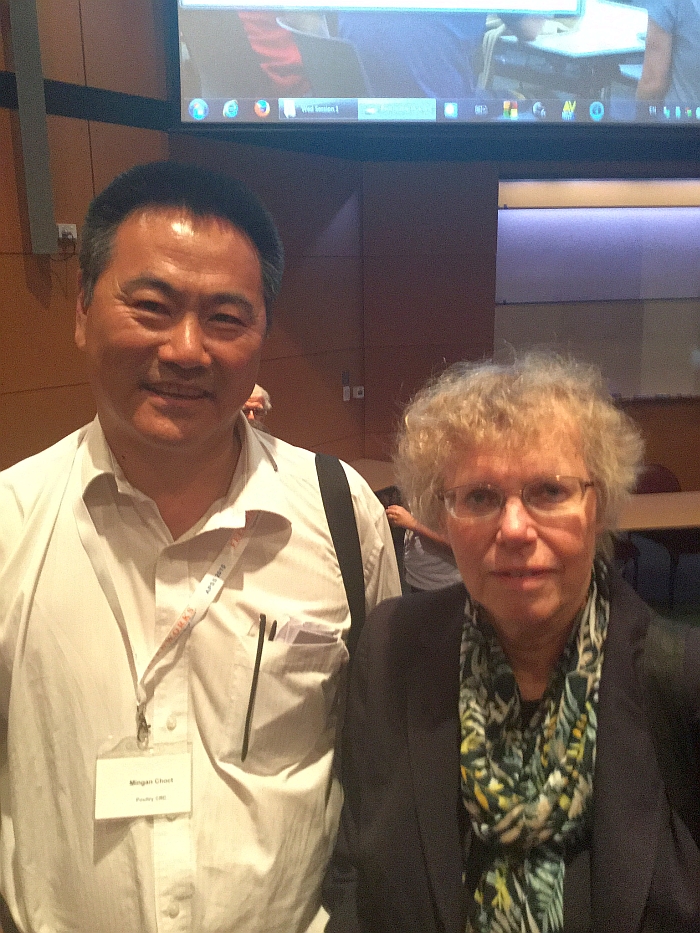Welcome to another edition of eChook!
The 26th Australian Poultry Science Symposium was held recently in Sydney where distinguished international and Australian scientists presented their latest scientific findings and most up-to-date views on poultry science and poultry production over three days. At the Symposium, the Australian Poultry Award, the most prestigious prize in Australia for someone who has made an outstanding contribution to poultry science and industry development, was presented. My sincere congratulations go to Dr Patrick Blackall, the Research Manager for the Poultry CRC and a Principal Research Fellow with the Queensland Alliance for Agriculture and Food Innovation at the University of Queensland! Another important award was the Poultry CRC’s Student Award, which went to Mr Aaron Ray. Congratulations, Aaron!
From the many great topics presented this year, I would like to highlight Professor Marian Dawkins’ talk on “Welfare and efficiency in poultry production”. Professor Dawkins, an academic from Oxford University, asks a pertinent question: “is there any place for animal welfare in a world concerned with providing enough food for humans, mitigating climate change and trying to preserve biodiversity?”
Professor Dawkins argued that animal welfare is in danger of losing momentum because it is dropping off the policy agenda of both the developed and developing economies. The reason is quite simple. On one hand, developing countries have the priority of feeding the hungry and view the animal welfare debate as one of the many ideological noises symptomatic of wealthy individuals who have never experienced hunger, do not know the value of food, and throw away a third of their food. On the other hand, the drive for efficiency dividends in agriculture in developed economies, puts higher priorities on the environmental aspect of food production, and perhaps sees the animal welfare debate as arising from a “fringe element” of society. In the media, all animal welfare debates are depicted as if they are always “the activist against the farmer” stories. If this continues into the future, the only loser will be the animals. To resolve this debate and to put animal welfare on the priority list of increasingly environmentally sensitive animal agriculture, we need to involve the farmer as an essential partner in the debate.
Professor Dawkins’ talk laid out a more pragmatic pathway, linking “welfare” and “economics” in the animal production industries where farmers would bring animal welfare to their business agenda because good welfare should mean commercial benefits. Indeed, the Poultry CRC recognised this link and established one of its key Programs, “Health and Welfare”. Health is of paramount importance to productivity and is a key aspect of welfare considerations.
Professor Dawkins provided an eloquent conclusion to the question: can we have it all? I will quote the concluding paragraph of her talk in its entirety. “There are potential conflicts between standards of welfare and commercial poultry production that can best be resolved by working with the poultry industry to find solutions to the many pressures it faces across the world. These include controlling disease, responding to worldwide calls to reduce anti-biotic use, meeting national and international standards of food safety and product quality, absorbing rising feed costs, improving efficiency of production and responding to demands for higher standards of animal welfare. Before assuming that welfare and efficiency are inevitably in conflict, we need to challenge some widely held assumptions and look for the economic gains that high standards of animal welfare can bring. As health is an important part of animal welfare, there are obvious economic gains from breeding programmes and management systems that concentrate on improving poultry health and thus have direct economic gains through more, healthier animals and losing less to waste. If animal welfare is seen as a single goal, isolated from other concerns of the poultry industry, then it is likely to lose out in the face of other priorities. But if its true economic value is appreciated, then animal welfare becomes firmly established as a key part of sustainable agriculture. Aust. Poult. Sci. Symp. 2015,26:233”.
Mingan



